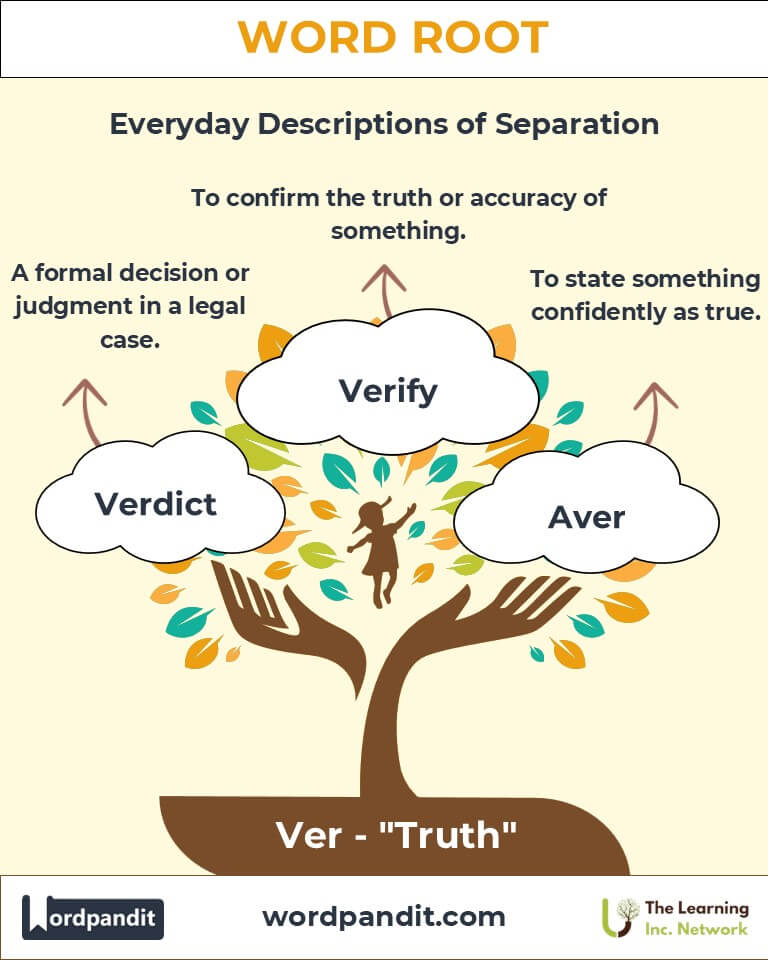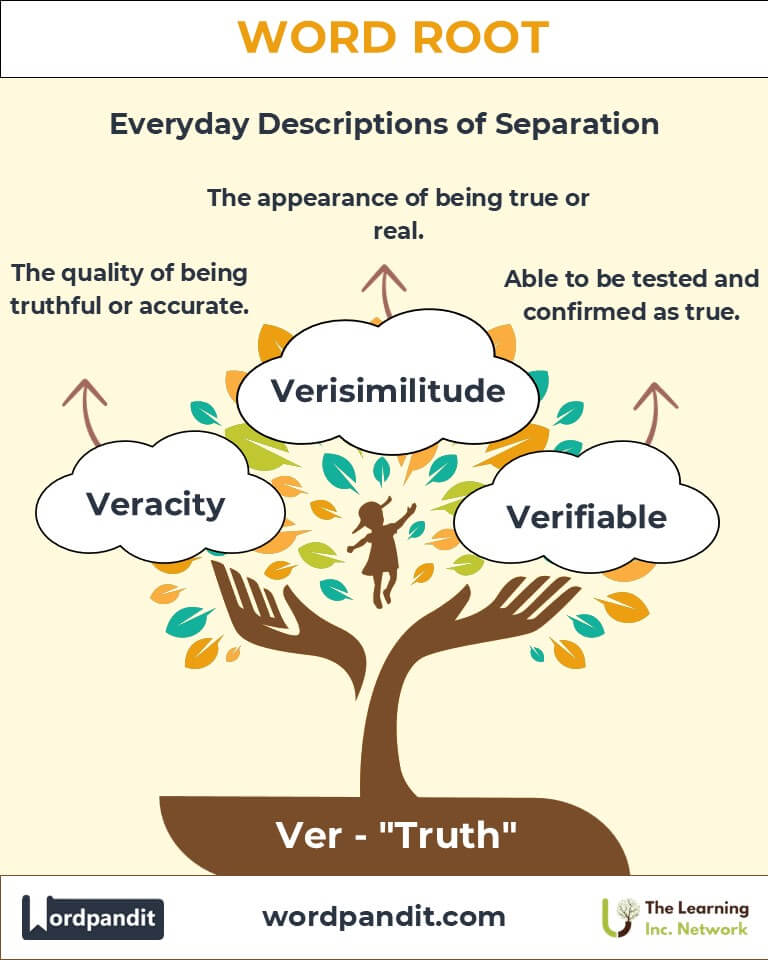Ver: The Root of Truth and Certainty in Language and Life
Byline: Explore the root "Ver," derived from Latin, meaning "truth." From everyday terms like "verify" to formal declarations like "verdict," this root is the cornerstone of words that emphasize honesty, reality, and certainty.

Table of Contents
- Introduction: The Essence of "Ver"
- Etymology and Historical Journey
- Mnemonic: Unlocking the Power of "Ver"
- Common Ver-Related Terms
- "Ver" Through Time
- "Ver" in Specialized Fields
- Illustrative Story: "Ver" in Action
- Cultural Significance of "Ver"
- The "Ver" Family Tree
- FAQs About the "Ver" Word Root
- Test Your Knowledge: "Ver" Word Root Quiz
- Conclusion: The Living Legacy of "Ver"
Introduction: The Essence of "Ver"
Imagine a world without truth—a place where nothing can be confirmed or trusted. The root "Ver" (pronounced "vur") ensures such a world remains a fantasy. Derived from the Latin word verus, meaning "true," this root forms the backbone of terms that demand honesty and accuracy. From legal judgments to personal assurances, "Ver" reminds us of the value of truth across disciplines and eras.

Etymology and Historical Journey
The root "Ver" originates from Latin verus, meaning "true" or "real." Its influence spread through Old French into English during the Norman Conquest, enriching the lexicon with words emphasizing authenticity. Over centuries, "Ver" found its way into legal, scientific, and everyday language, symbolizing the pursuit of truth.
Mnemonic: Unlocking the Power of "Ver"
To remember "Ver," visualize a glowing "truth detector" that lights up only when honesty prevails.
Mnemonic Device: "Ver unveils the truth; let honesty verify reality."
Common Ver-Related Terms
- Verify (ver-uh-fye): To confirm the truth or accuracy of something.
Example: "The scientist verified the experiment’s results before publication." - Verdict (ver-dikt): A decision or judgment, especially in a legal context.
Example: "The jury’s verdict brought closure to the trial." - Veracity (ver-as-i-tee): The quality of being truthful or accurate.
Example: "The journalist’s veracity was unquestionable." - Aver (uh-vur): To state something confidently as true.
Example: "She averred her innocence during the hearing." - Verisimilitude (ver-uh-si-mil-i-tood): The appearance of being true or real.
Example: "The novel’s verisimilitude made readers believe it was based on true events."
"Ver" Through Time
- Verdict (Middle Ages): Initially referred to "truth spoken" by a jury.
Evolution: The term became synonymous with legal decisions over time. - Verify (Renaissance): Emphasized the importance of validation in emerging scientific methods.
Shift: From legal usage to scientific and everyday contexts.
"Ver" in Specialized Fields
- Law:
- Verification: Ensures authenticity in legal documents.
- Verdict: The final decision in a court case.
- Science:
- Verifiable Data: Data that can be tested and confirmed.
- Application: Essential for establishing scientific theories.
- Literature:
- Verisimilitude: Creates realistic narratives in fiction.
- Significance: Enhances reader engagement and belief in the story.
Illustrative Story: "Ver" in Action
In a bustling courtroom, attorney Lisa fought to prove her client’s innocence. She presented verified evidence and confidently averred her arguments. The jury deliberated and delivered a verdict of “not guilty.” Lisa’s commitment to truth showcased the profound impact of the "Ver" root in justice and trust.
Cultural Significance of "Ver"
Truth is a universal value celebrated in culture, literature, and ethics. Phrases like "in vino veritas" (in wine, there is truth) highlight humanity's eternal quest for honesty. From sacred oaths to everyday conversations, the root "Ver" reinforces our collective commitment to truthfulness.

The "Ver" Family Tree
- Veri- (Truth):
Examples: Verification (the process of proving truth), Veritable (genuine or true). - -dict (Say, Speak):
Examples: Predict (to speak of something before it happens), Contradict (to speak against or deny). - Simil- (Likeness):
Examples: Similitude (likeness or resemblance), Assimilate (to absorb and make similar).

FAQs About " Ver "
Q: What does "Ver" mean, and where does it come from?
A: "Ver" means "truth" and originates from the Latin word verus, which means "true" or "real." This root forms the basis of many English words associated with authenticity, honesty, and certainty.
Q: What is the significance of "verify"?
A: "Verify" means to confirm the truth or accuracy of something. It plays a crucial role in science, law, and everyday life, ensuring that facts and claims can be trusted and relied upon.
Q: How is "veracity" different from "accuracy"?
A: While both involve correctness, "veracity" emphasizes truthfulness and honesty, particularly in someone's character or statements. "Accuracy," on the other hand, focuses on precision and correctness in details or data.
Q: What is "verisimilitude," and how is it used in literature?
A: "Verisimilitude" refers to the appearance of being true or realistic. In literature, it describes how believable a story or narrative feels, even if it is fictional. Writers use it to create relatable worlds that resonate with readers.
Q: Why is a "verdict" tied to truth?
A: A "verdict" is the formal decision or judgment made in a legal case, often determined after assessing the truth of evidence and testimonies. The word combines "ver" (truth) and "dict" (to say), meaning "a statement of truth."
Test Your Knowledge: " Ver " Mastery Quiz
1. What does "Ver" mean?
2. Which word means "to confirm the truth"?
3. What does "veracity" signify?
4. Which field commonly uses "Verdict"?
5. What does "verisimilitude" describe in literature?
Conclusion: The Living Legacy of "Ver"
The root "Ver" continues to anchor language in truth, fostering trust and authenticity in law, science, literature, and daily life. As we navigate an increasingly complex world, the value of "Ver" remains indispensable, reminding us of the enduring power of honesty. Let "Ver" inspire you to seek and uphold the truth in all you do!












